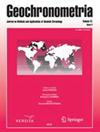全谱分析在NaI(Tl)γ能谱测定埋葬剂量率中的应用
IF 0.9
4区 地球科学
Q3 Earth and Planetary Sciences
引用次数: 0
摘要
摘要在本研究中,我们探索了基于NaI(Tl)闪烁体的伽马能谱仪在全谱分析(FSA)方法中准确测定自然地质样品中埋藏剂量率的潜力。在该方法中,在减去适当的背景后,使用迭代加权最小二乘回归将校准标准光谱(40K, 238U和232Th系列处于平衡状态)拟合到样品光谱。40K、238U和232Th的最小检出限分别为4.8、0.4和0.3 Bq·kg - 1(对于0.23 kg的样品);这比我们之前报道的三窗口方法获得的结果低一个数量级,远低于大多数天然沉积物中的浓度。这些改进的值也可与高分辨率HPGe伽马能谱法的值相媲美。20个天然样品中40K、238U和232Th的活性浓度与高分辨率光谱值相差≤5%;NaI(Tl)谱与HPGe谱的平均剂量率之比为0.993±0.004 (n=20)。我们的结论是,采用FSA的闪烁光谱系统是一种有用的替代实验室方法,可以准确和精确地测定埋葬剂量率,其成本明显低于高分辨率伽马能谱法。本文章由计算机程序翻译,如有差异,请以英文原文为准。
The Application of Full Spectrum Analysis to NaI(Tl) Gamma Spectrometry for the Determination of Burial Dose Rates
Abstract In this study, we explored the potential of a NaI(Tl) scintillator-based gamma spectrometer for the accurate determination of burial dose rates in natural geological samples using a full spectrum analysis (FSA) approach. In this method, an iterative reweighted least-square regression is used to fit calibration standard spectra (40K, and 238U and 232Th series in equilibrium) to the sample spectrum, after subtraction of an appropriate background. The resulting minimum detection limits for 40K, 238U, and 232Th are 4.8, 0.4 and 0.3 Bq·kg−1, respectively (for a 0.23 kg sample); this is one order of magnitude lower than those obtained with the three-window approach previously reported by us, and well below the concentrations found in most natural sediments. These improved values are also comparable to those from high-resolution HPGe gamma spectrometry. Almost all activity concentrations of 40K, 238U, and 232Th from 20 measured natural samples differ by ≤5% from the high resolution spectrometry values; the average ratio of dose rates derived from our NaI(Tl) spectrometer to those from HPGe spectrometry is 0.993 ± 0.004 (n=20). We conclude that our scintillation spectrometry system employing FSA is a useful alternative laboratory method for accurate and precise determination of burial dose rates at a significantly lower cost than high resolution gamma spectrometry.
求助全文
通过发布文献求助,成功后即可免费获取论文全文。
去求助
来源期刊

Geochronometria
地学-地球科学综合
CiteScore
2.20
自引率
0.00%
发文量
1
审稿时长
>12 weeks
期刊介绍:
Geochronometria is aimed at integrating scientists developing different methods of absolute chronology and using them in different fields of earth and other natural sciences and archaeology. The methods in use are e.g. radiocarbon, stable isotopes, isotopes of natural decay series, optically stimulated luminescence, thermoluminescence, EPR/ESR, dendrochronology, varve chronology. The journal publishes papers that are devoted to developing the dating methods as well as studies concentrating on their applications in geology, palaeoclimatology, palaeobiology, palaeohydrology, geocgraphy and archaeology etc.
 求助内容:
求助内容: 应助结果提醒方式:
应助结果提醒方式:


